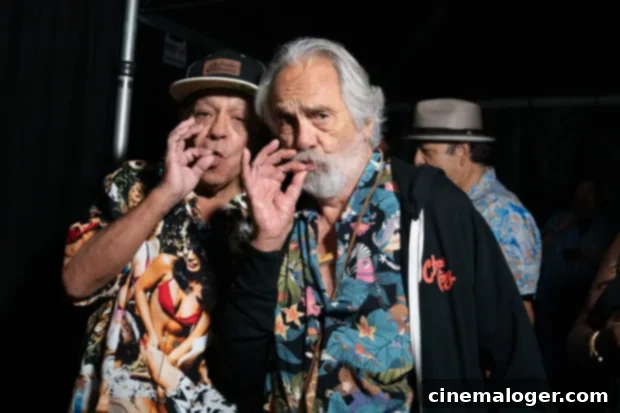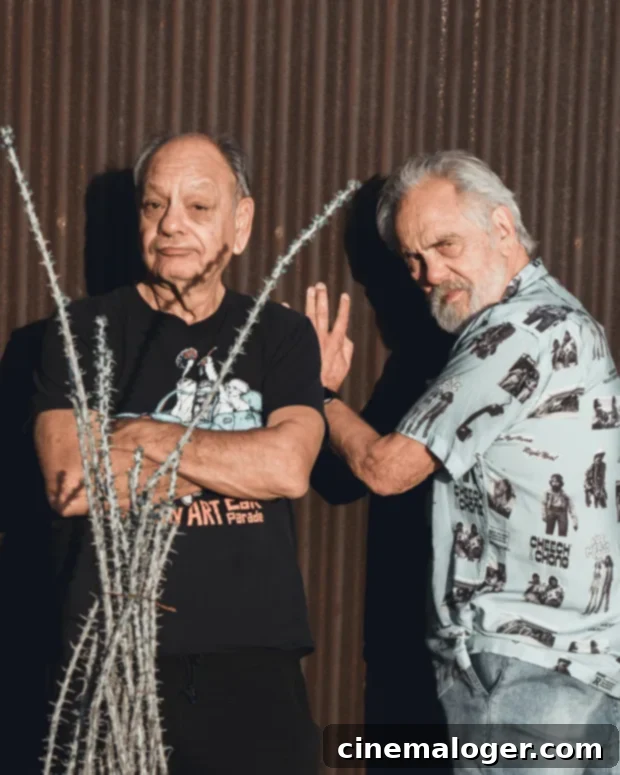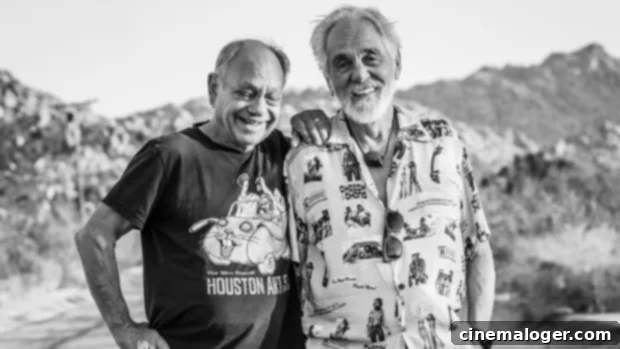Cheech Marin’s Wisdom: Navigating the Evolving Cannabis Industry as Celebrities Eye 4/20 Opportunities
As the cannabis industry continues its rapid evolution, fueled by increasing decriminalization efforts across the United States, a growing number of celebrities are exploring opportunities to launch their own branded product lines. Yet, according to comedy legend and counterculture icon Cheech Marin, this burgeoning market is far from a walk in the park. Marin, co-creator of the pioneering Cheech & Chong Cannabis Co. and founder of the nation’s first Chicano art museum, offers a candid perspective for stars looking to make their mark: “It’s a tough business – good luck!” he advises with a characteristic laugh during an exclusive interview with HollywoodLife.
Marin’s advice isn’t delivered with cynicism but with the seasoned wisdom of someone who has not only been a central figure in cannabis culture for over five decades but has also navigated the complexities of its commercial landscape. Alongside his long-time creative and comedy partner, Tommy Chong, he helms the Cheech & Chong Cannabis Co., which features popular brands like Cheech’s Stash and Tommy Chong’s CBD. These products, along with countless others, are set to be celebrated during the upcoming cannabis holiday, 4/20, a date that Marin, turning 77 in July, has seen commemorated numerous times throughout his life.
Cheech’s longevity in the public eye and his deep personal connection to cannabis have given him a unique vantage point on the industry’s dramatic shifts. He recalls a time when the market was vastly different, offering insights into the current competitive landscape. “It’s actually a tough business to make money in because there’s so much competition,” Cheech explains to HL. He highlights the drastic change in pricing, noting, “The price of weed went down from a thousand dollars a pound to a hundred dollars a pound. Many people anticipated that prices would only continue to soar, but with so many individuals and large-scale operations cultivating cannabis, the supply has dramatically increased, driving prices down significantly.”

Finding Your Niche in a Saturated Market
Despite the market challenges, the allure of the cannabis industry remains strong for many entrepreneurs, including a notable roster of celebrities. Figures like Berner, Seth Rogen, Melissa Etheridge, Lil Kim, and Jay-Z have successfully launched their own lines of THC, CBD, and lifestyle products, demonstrating that success is possible with the right approach. Cheech emphasizes that for any newcomer, particularly those leveraging their public profile, differentiation is paramount. “You have to figure out what is your path,” he advises. “What is your niche inside this [industry]? And how can you sustain it in the long term?”
He underscores the importance of a clear strategy, noting that simply attaching a celebrity name to a product isn’t enough to guarantee longevity or profitability. With the market becoming increasingly saturated, a unique selling proposition, a strong brand identity, and a deep understanding of the target consumer are vital. Brands that resonate with specific demographics, offer unique product formulations, or provide a distinct brand experience are more likely to thrive amidst the fierce competition.
Anticipating Federal Legalization and Market Shifts
Marin also points out the inherent instability of the current cannabis market, which operates largely at a state level without federal legalization. The industry, he says, will remain “in limbo until it’s legal federally.” This federal reform is expected to be a game-changer, fundamentally altering the operational landscape. “When it’s legal federally, you don’t have all the restrictive laws you have now, where you have to grow and sell in the same state,” Cheech explains. This shift would open doors for interstate commerce, potentially leading to national brands, streamlined logistics, and increased investment, but also a new wave of competition from established corporations.
View this post on InstagramA post shared by Cheech Marin (@cheechmarin)
The Progressive March Towards Legalization and Its Impact
The current environment around cannabis is vastly different from decades past, reflecting a significant shift in public opinion and legislative action. As we approach the 2023 4/20 festivities, cannabis is legally accessible in some form—either medically or recreationally—across 46 U.S. states and territories, a figure confirmed by Leafwell, a leading resource for cannabis data and advocacy. This widespread acceptance is mirrored in public sentiment; a 2022 Gallup poll, as reported by CNN, revealed that a substantial 69% of polled Americans believe cannabis should be fully legal.
Adding to this momentum, President Joe Biden made a landmark move in 2022 by pardoning thousands of individuals previously convicted of “simple marijuana possession” under federal law. In a statement widely reported by CNBC, President Biden asserted, “Just as no one should be in a federal prison solely due to the possession of marijuana, no one should be in a local jail or state prison for that reason, either.” Furthermore, he initiated a review of cannabis’s classification under federal drug laws, instructing Secretary of Health and Human Services Xavier Becerra and Attorney General Merrick Garland to explore rescheduling. Currently, cannabis remains a Schedule 1 substance, categorizing it alongside dangerous drugs like heroin and above fentanyl, a classification many experts argue is outdated and scientifically unfounded given its proven medical applications and lower abuse potential compared to other scheduled substances.
Despite significant progress, a handful of U.S. states and territories still maintain strict prohibitions against all forms of legal cannabis programs, both medicinal and recreational. These include Idaho, Indiana, Kansas, Kentucky, Nebraska, South Carolina, Tennessee, Wisconsin, Wyoming, and American Samoa. Curiously, even in Washington D.C., where cannabis is legal for adult use, a lack of regulated dispensaries creates a unique market dynamic. “And Washington DC – it’s legal in Washington DC, but there are no dispensaries,” Cheech highlights, underscoring the fragmented and often contradictory legal landscape. “So all that sh*t will change. And then, when it does, and then it’ll make sense for a big conglomerate to buy us. And then I can leave it to my kids and go off to my just reward.” His comment reflects a pragmatic view of the future, envisioning a consolidated market ripe for acquisition by larger entities once federal consistency is achieved.
View this post on InstagramA post shared by Cheech Marin (@cheechmarin)
Cheech & Chong: An Enduring Legacy Beyond Cannabis
Until the promised “reward” of a federal buyout arrives, Cheech Marin (born Richard Anthony Marin) remains actively immersed in various ventures. For over five decades, the duo of Cheech & Chong has been synonymous with cannabis culture, their influence extending far beyond their iconic stoner comedy. Their self-titled debut comedy album marked its half-century anniversary in 2021, while their groundbreaking first film, Up In Smoke, celebrates its 45th year. These milestones are a testament to their enduring appeal and significant cultural impact.
Their relevance in contemporary culture is undeniable. The official Cheech & Chong TikTok account boasts over 7.2 million followers and an astonishing 100 million likes, demonstrating their continued resonance with new generations. In March, they expanded their digital footprint with the launch of Bowlmates, an online cannabis community designed to connect enthusiasts. The same month brought exciting news for fans, as they issued a joint statement to Entertainment Weekly, confirming plans for a biopic that will delve into their origins and profound influence on comedy, music, and counterculture.
Cheech & Chong’s presence in popular culture never truly waned, even during their period of separation in the 1980s. Cheech, a versatile performer, maintained a robust solo career. He directed and starred in the critically acclaimed yet underrated film Born In East L.A., showcasing his talent behind the camera. His acting credits are extensive and diverse, including memorable roles in blockbusters like Ghostbusters II, the beloved family film Troop Beverly Hills, the sports comedy Tin Cup, the Quentin Tarantino-penned horror flick From Dusk Till Dawn, and the popular Spy Kids franchise. Beyond comedy and film, Marin also demonstrated his range as an actor by joining the hit TV series Nash Bridges, where he played the role of Inspector Joe Dominguez, providing a more serious, yet still charming, counterpoint to his comedic persona.
Championing Chicano Art: The Cheech Marin Center
More recently, Cheech Marin has continued to expand his impressive resume, appearing alongsideJennifer LopezinShotgun Wedding and with Woody Harrelson in Champions. Beyond his entertainment career, Cheech has dedicated himself to a passion project that holds immense cultural significance: the launch of The Cheech Marin Center for Chicano Art & Culture. This groundbreaking institution stands as the first museum in the United States entirely dedicated to Chicano art and culture, a testament to Marin’s lifelong commitment to preserving and elevating this vital artistic heritage. “You know, I can’t believe that it happened. I’ve been thinking of all the factors that came together for the museum to happen,” he shares with HL, expressing genuine awe at the realization of his vision. He recounts the unique confluence of community support, institutional propositions, and most importantly, his extensive private collection, which became the cornerstone of the museum. “I don’t know of any other museum that could have taken the whole collection and featured it as the mainstay of the museum. No other museum I know could accept, even if they wanted to, 550 paintings all at once,” he remarks, highlighting the sheer scale and foundational importance of his collection to the center.
The Rock & Roll Hall of Fame Snub: A Comedian’s Plea
While celebrating his diverse achievements, Cheech Marin continues to advocate for another significant recognition: the induction of Cheech & Chong into the Rock & Roll Hall of Fame. “I am still pissed off that we’re not there,” he states, a year after first discussing the topic with HollywoodLife. He articulates his frustration, “It doesn’t make any sense. I don’t know what it is. I don’t know why we were not even invited. We were not ever invited to be on Saturday Night Live, either. [But] if there are comedians that should be in the Rock & Roll Hall of Fame, it’s definitely Cheech and Chong.” His argument stems from a belief that their unique blend of comedy and music transcends traditional genre boundaries, making them prime candidates for an institution that celebrates cultural impact and influence.
The case for Cheech & Chong’s induction is indeed compelling. Their musical output was not only popular but also critically impactful. Three of their albums—Big Bambú, Los Cochinos, and Cheech & Chong’s Wedding Album—achieved significant commercial success, each reaching the Top 5 on the prestigious Billboard 200 charts. Beyond album sales, their singles also made a mark: “Basketball Jones” climbed to no. 15 on the Billboard Hot 100, while their 1974 single, “Earache In My Eye,” became a Top Ten hit. The latter’s influence is particularly evident, having been covered by a diverse array of prominent rock and metal acts, including Rollins Band, Soundgarden, Government Panic, Rush, and Korn, showcasing their undeniable crossover appeal and musical resonance within the rock genre.
Marin poses a poignant question that highlights the hypocrisy of their exclusion: “When you have other rock and roll stars covering your music, and you’re the comedian, what does that say about being in the Rock & Roll Hall of Fame?” Despite his strong feelings, he maintains a hopeful, if slightly weary, outlook. “I’ve given up being upset about it. It’ll happen, eventually. I just hope we’re still alive,” he concludes, reflecting a desire for due recognition while still living to experience it.
Music, Creativity, and the Art of the Post-Sesh Session
Even without a formal induction into the Rock Hall, Cheech Marin continues to embody the spirit of a rockstar, particularly after a “sesh.” His deep love for music is evident in his personal habits. “I love to play more than anything after I’ve been smoking,” he tells HL, revealing a cherished creative routine. He recently brought all his guitars from the garage, preferring to play acoustic instruments, though he owns electric guitars as well. “I have electric guitars but no drummer, so I don’t need to be electric,” he quips, highlighting his solo musical explorations. His impressive collection includes several six-string guitars, three twelve-string guitars, and, surprisingly, a growing number of ukuleles, which he’s been “playing a lot lately.” This diverse range of instruments speaks to his eclectic musical tastes and ongoing curiosity.
Cheech shares his philosophy on musical mastery and the role of cannabis in his creative process. “If you’re a musician, and that’s all you do, man, you can get good at it,” he says, underscoring the importance of dedication. However, he distinguishes between practice and performance, especially when it comes to cannabis. “But I generally don’t practice after I’ve smoked. If I practice, I’m practicing. I’ll do scales, do this and that.” For Cheech, smoking comes after the hard work of learning. “And it’s when I’ve kind of worked through a song, and I actually know it, then I can smoke and then sing it, and it’s another song.” This suggests that cannabis helps him inhabit and reinterpret a piece, rather than aiding in the technical acquisition of skills.
He elaborates on the journey of internalizing music: “You got to get to learning the song until you’re not even thinking about making the chord changes; they just come automatically. That takes a lot of times playing that song.” Marin’s musical roots run deep; he recalls, “I was always a singer all my life, since I was like five years old. And a guitar player– I think [I was] 11 or 12 when I started playing guitar. But always the singer.” He humorously adds that consistent vocal practice requires “just having to have a tolerant wife.”
Fortunately, his wife, classically trained pianist Natasha Marin, is also a musician, which creates a harmonious household. “But she’s a musician as well,” Cheech notes, “so it works out well.” Their shared passion for music undoubtedly enriches their lives and offers a creative outlet that complements Cheech’s many other endeavors.

Cheech’s 4/20 Playlist & Strain Pairings
For those celebrating 4/20, adding the extensive Cheech & Chong discography to their playlist is a must. And for those fortunate enough to acquire some of Cheech’s Private Stash, his own branded line of cannabis, Marin offers personalized music recommendations to enhance the experience. For fans enjoying the “Was Sappening” sativa strain, he suggests “some up-tempo music.”
“Anything that’s up-tempo that you like because people like different kinds of music. But find some up-tempo one, and I think you’ll be happy,” he advises. He specifically champions the iconic East L.A. band: “Listen to Los Lobos. They’re great. They’ve always been great. I’ve just been listening to a little bit of them in the last couple of days, old albums that I wanted to. And some albums I never knew existed. They were just such great players, singers, and songwriters. You recognize their music immediately. So Los Lobos, listen to Los Lobos.” Their dynamic and genre-bending sound perfectly complements the uplifting effects of a sativa.
What about those who opt for the calming effects of the “So Too Much” indica strain? “Something slower,” he tells HL. Marin then surprises with an unexpected genre: “I’ve been listening to a lot of, you won’t believe this, but Oud music. It’s a Middle Eastern instrument, like a guitar or mandolin. And I’ve been listening to Oud players lately.” He specifically recommends a unique artist for Western listeners: “But this is one guy, Sandy Bull. If you’re a Westerner, he’s your introduction to Oud Music because he’s like the world’s only Oud jazz player.” Bull’s blend of traditional Middle Eastern sounds with jazz improvisation offers a serene and introspective soundtrack ideal for an indica experience.
And for the versatile “Fuchi Que Pesta” hybrid strain, Cheech’s advice is fittingly expansive: “Listen to anything. Listen to Grateful Dead because that’s everything. You know?” he says with a laugh, subtly poking fun at their famously fluid musical structure. “They don’t know what song, they don’t know what key. That was my only comment about the Grateful Dead, ‘just find a key and stay there.’ So, listen to the Grateful Dead.” Their eclectic and improvisational style, covering a vast emotional and sonic landscape, makes them the perfect companion for a hybrid, allowing the listener to drift through various moods and sounds.
No matter what you listen to, consume responsibly and legally. Consult NORML for information about laws in your state, and make yourself aware of potential health risks. Do not indulge if you are under 21, and follow these guides on how to be responsible this 4/20.
Editor’s Note: earlier versions of the piece erroneously referenced The Cheech as the official documentary launching The Cheech museum.
